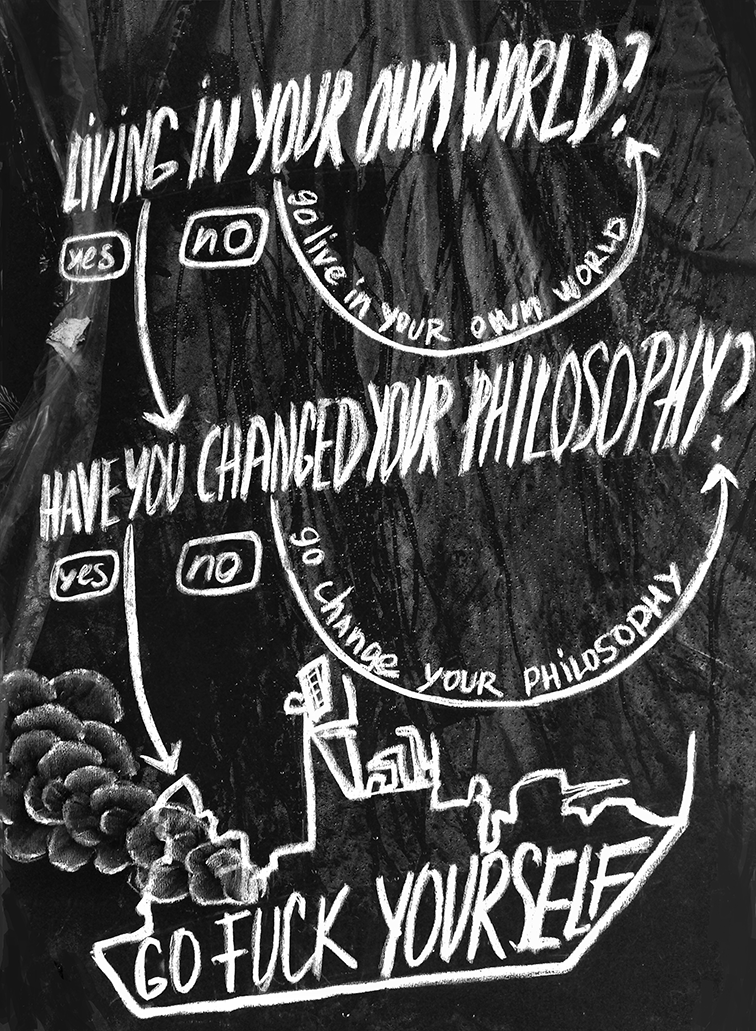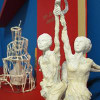LETTER TO NIKITA
This text is a public address to artist Nikita Kadan who decided to withdraw from the panel: Artists in Times of Emergency, Chaired by Ronen Eidelman. 16.09.2022
At The conference: Jerusalem Art Conference #7, organized by Manofim Festival and Erev Rav (https://www.erev-rav.com) and Harama Magazines
Dear Nikita!
I’m trying to remember when we have first met each other —
probably this happened after the first actions of the REP (Revolutionary-experimental space) in 2005, during the first Maidan.
They were kind of in sync with our collective politics and aesthetics of that time. And then we began to be exhibited together often — in different countries, in Russia and everywhere, and we met — and we talked.
I don’t think we are friends, but we are comrades.
When I was invited to this panel, I was in Saint Petersburg hoping that we would continue our resistance in Russia but then my house was raided by the police and Olga and I decided to leave the country.
Do you think I should stay and go to jail?
Do you think I should go underground and take to the arms?
Apologize for these rhetorical questions.
Recently I have read an interview with you published in Russian and English at Arterritory, where you said the important words: “… there is caution as a consequence of the pressure of public opinion — in relation to this pressure, art always comes through the independence test. Now this exam has become more difficult than it was before. And there is caution as an element of movement through the minefield of meanings. Here you are not answering to a civil consensus, but to the “actual state of things.” (1)
You’re right — “we are moving through a minefield of meanings.”
Now when you canceled your participation in the discussion with me, and Marina Naprushkina (because I have a Russian passport and she has a Belarusian one, right?) I have the feeling that we “hit a mine”.
It’s hard for me to imagine what the Ukrainian artist is feeling now in the situation of 8 years of ongoing war.
Do you remember in June 2014, when you came to St. Petersburg to our invitation when the war in Eastern Ukraine just started? Then the School of Kyiv published an important document “On the Conditions for The Possibility of Communication”. It was about communication between two schools in the situation of war — one in Kyiv and our School of Engaged Art in Petersburg.
I’m not sure if you, as a teacher, took part in writing this collective text but let’s read it together. Do you remember this statement?
“The risk inherent in communication
How can you hear the party that cuts off communication? How do you come to comprehend a way of thinking that’s foreign to you? How can you assimilate information from afar, from the distance of your capacity for sensory perception?”
Or this one:
“Determining the significance of fundamental positions
This is “boring” and difficult, but it will facilitate further communication. Finding the method for doing this is one of the main challenges of communication, especially in the course of developing events, when communication is immediately crucial (and must take place without risky, oversimplified categories such as “Russia,” “liberal,” and so on).”
And then next one come into my mind:
“Culture as a field for trans-border cooperation
Reducing the pressure of territorial borders and professional castes in the process of communication. The impossibility of dividing people into Russian and Ukrainian cultural workers; cultural workers and everyone else. At the same time, seeing cultural workers as “community functionaries,” a globalized class that pursues common interests, capable of facilitating communication in a conflict situation.”
Now this document sounds like the evidence of another era when the world was different and we were different.
Until now, I have kept the faith that, like the fight against fascism, the fight against Putinism requires international solidarity which does not silence any voice, even if it comes from inside Russian context, or Iranian situation, or Armenian.
And I hoped that this value we need to defend together, no matter what country’s passport we have in our pocket and we cannot compete, who is more hurt and who is more victimized.
I try to hear your gesture, your silence, your refusal.
Your colleague from Kyiv Olexii Kuchanskyi wrote important words in early April 2022.
It Is Not The “Ukrainian Issue. A letter from a civil body on activism and cultural production at war”
It is absolutely inconceivable, but it seems to be the time when binary opposition is useful. See the difference, neither Russians—Ukrainians nor Russia—NATO. The opposing sides are Putinism, that that kills civilians and the environment in order to kill more, — and a transnational network of those, who believe in futures, which are alternatives to this creepy destructive alienated war technology. (2)
Then Olexii, wrote about empathy as an important quality of resistance — something that Putinism does not have.
Don’t you think that the rejection of any open communication, this transition from the Conditions for The Possibility of Communication in 2014 to the impossibility of communication in 2022, could be a marker of general contemporary sensibility, which has appeared quite recently and has become a certain model of behavior?
I have learned that we should have zero tolerance towards fascism, but now it has become very easy to declare anyone else as fascist, to blame someone in wrong belongingness, to demand collective responsibility and then empty any space of dialogue.
Do I have the right to say that I am ready to talk to you?
What should I do to talk to you?
How could I carry the burden of responsibility, that you would consider appropriate to your pain?
How can I know about it, if the space of communication is cut-off?
What should happen to both of us to make us talk again?
Once upon a time this summer, in our commune, we read a call by Ukrainian President Zelensky demanding that all Russians should be expelled from abroad, regardless of their political position, then they could take part in armed struggle inside the country and overthrow Putin. Or, frankly to say they must be just sent back for collective punishment, because they are impotent to make any revolt.
I am not ready to discuss with you now if this call was reasonable or not (although some European countries took it quite literally), but it was formulated in a rather fairy-tale language.
“let them (Russians) live in their own world until they change their philosophy.”
It seemed to us that this appeal was addressed to us personally, as well as your refusal to speak here. And we constantly returned to it — yes, we have been living in our own world, and for us it meant that we are building and growing our own space free from dehumanization, militaristic and patriotic frenzy, in solidarity with comrades around and far from us, in solidarity with the struggle of the people from Ukrainе, a space founded on empathy and care.
Should we change our philosophy?
Or should we stay in resilience to what’s going on around?
We do not know, but the formation of this space was important for us
and may be the only way to resist Putinism.
Do you need my/our silence?
Do you want me/us to disappear?
Can I embrace you?

Notes:
1. https://arterritory.com/en/visual_arts/interviews/26322-the_world_has_been_seeped_in_war?fbclid=IwAR27PlI-tzRD6L7wtf3s3Q8w95XHmz2nevuwnTTufhiq9SGzVbx7r9qrrMA
2. published at https://transitorywhite.com/articles/it-is-not-the-ukrainian-issue)
I have asked the organizers of the conference to transfer the fee for this speech to any organizations in Ukraine which support the fight against Russian colonial war.
Thanks a lot to Sophia Slonim for the help with text editing
